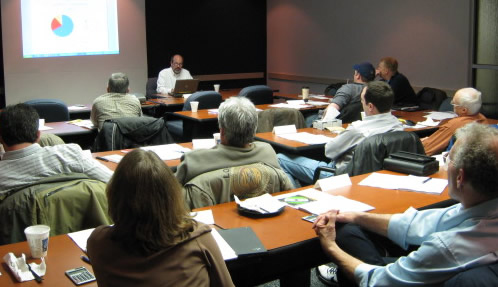MEP News
WIRED for Energy Efficiency
By Ethan Rogers, Purdue University Technical Assistance Program

If you think you have high heating and electrical bills, consider this: Haynes International, Inc. spends $9.5 million in natural gas and $5 million in electricity at its Kokomo, Indiana plant.
The company is a leading developer, manufacturer, and marketer of technologically advanced performance alloys, primarily for the aerospace and chemical processing industries. Headquartered in Kokomo, Haynes has additional plants in North Carolina and Louisiana, with service centers throughout the United States, Europe, and China. With 1200 employees worldwide, the company not only faces huge costs but is also challenged with building and maintaining a skilled trades workforce.
“We’re looking for employees who can problem solve and trouble shoot, not just follow instructions,” said Jean Neel, vice president for corporate affairs for Haynes. “Like all manufacturers today, we know that the kind of talent pool to keep our business growing strong requires a combination of safety awareness, environmental awareness, technical skills, problem solving, and continuing education.”
Given the size of the company’s huge furnaces and related energy bills, Haynes was interested when it heard about a new program offered by the Indiana Manufacturing Extension Partnership center, through the Technical Assistance Program (TAP) at Purdue University. The energy efficiency program would provide both energy savings and workforce training that could potentially translate into short- and long-term benefits for Haynes.
The program is part of a three-year pilot initiative in North Central Indiana, supported by a $15 million grant from the U.S. Department of Labor. The WIRED program—an acronym for Workforce Innovation in Regional Economic Development—is one of dozens across the country in which regional government, economic development, and business leaders are working together to develop and implement transformational strategies focused on workforce improvements that will have long-lasting economic impact on the entire region.
For North Central Indiana, one of the key strategies is to “develop 21st century talent,” explains Christy Bozic, manager of business innovation for TAP and the coordinator of the WIRED grant for the organization. Via the WIRED grant, the program has zeroed in on some of the key skills workers need today, by industry cluster, and is providing the training that will help these industries become globally competitive.
“Today’s workers—and their employers—need many new skills to succeed compared to what was needed even just ten years ago,” said Bozic. “Environmental training that will empower workers to identify and implement waste reduction and other environmental improvements is one of the most important. This is a great new set of skills for today’s workers that will help them be even more valuable as more companies implement energy-saving strategies.”
For ISO 14001 certified Haynes, training and empowering workers on energy efficiency “was an easy decision and a smart investment,” said Neel. The program began with an energy assessment of the company, including onsite training and energy stream mapping. TAP partnered with the Department of Energy for the assessment, in which it identified ways to decrease utility bills, decrease production costs, and curb emissions throughout the facility.
One area the assessment pointed to for improvement was the plant’s gas fired reheat furnaces. Through examining oxygen levels, gas consumption, quality demands, processes, and leaks, the company realized within just a few months annual cost savings of half a million dollars in gas usage. “Given our enormous gas and electric bills, even just a small percentage in savings translates into big dollars,” said Neel.
These savings were typical of similar assessments conducted at other manufacturers in the region. According to Bozic, in just the first four energy audits, close to $1 million in cost savings annually was identified. Energy assessments like these offered by TAP are available through many of the other Manufacturing Extension Partnership centers located around the country, in conjunction with other regional WIRED initiatives and other programs.
For Haynes, the energy assessment was just the start of an ongoing sustainable program. The company gathered an internal team of employees to be trained and receive energy efficiency certificates, and become energy stewards. This team is now routinely involved in reviews of the company’s production process, upgrades, and capital improvements, with a goal to continually improve energy efficiency, conservation, and emissions reductions throughout the plant.
In addition, Haynes plans to create another employee team that will focus on green workforce training. North Central Indiana’s WIRED Green Workers Certification—another component of the overall WIRED agenda—takes a workforce approach to clean and green manufacturing. “Most ideas in clean manufacturing come from the production line, those who work daily on the plant floor,” said Bozic. “Starting there, we know we can drive efficiency and environmentally clean practices throughout the value chain.”
Workers from Haynes and other companies who participate in this program will learn all the basics of clean manufacturing—carbon credits, water resource management, waste minimization, alternative energy sources, and more—and the impacts of the manufacturing process on the environment.
For Haynes, these latest activities fit in with an established program of recycling and an attention on environmental engineering that also protects the company’s bottom line. Haynes President and CEO Francis J. Petro set the tone for the company when he said, “Energy conservation, recycling, and protecting the environment always makes good business sense over the long haul.”
Ethan Rogers is the manager of energy efficiency services (www.purduenergy.com) for the Technical Assistance Program (TAP) at Purdue University. TAP leverages resources in both the public and private sectors to identify areas of improvement, streamline processes, and increase competitiveness for all of Indiana’s manufacturers.
TAP and its Indiana Manufacturing Extension Partnership is an affiliate of the National Institute of Standards and Technology Manufacturing Extension Partnership (MEP), headquartered in Gaithersburg, Maryland. Information can be found at its web site: www.mep.nist.gov. Inquiries can be sent via e-mail to mfg@nist.gov.